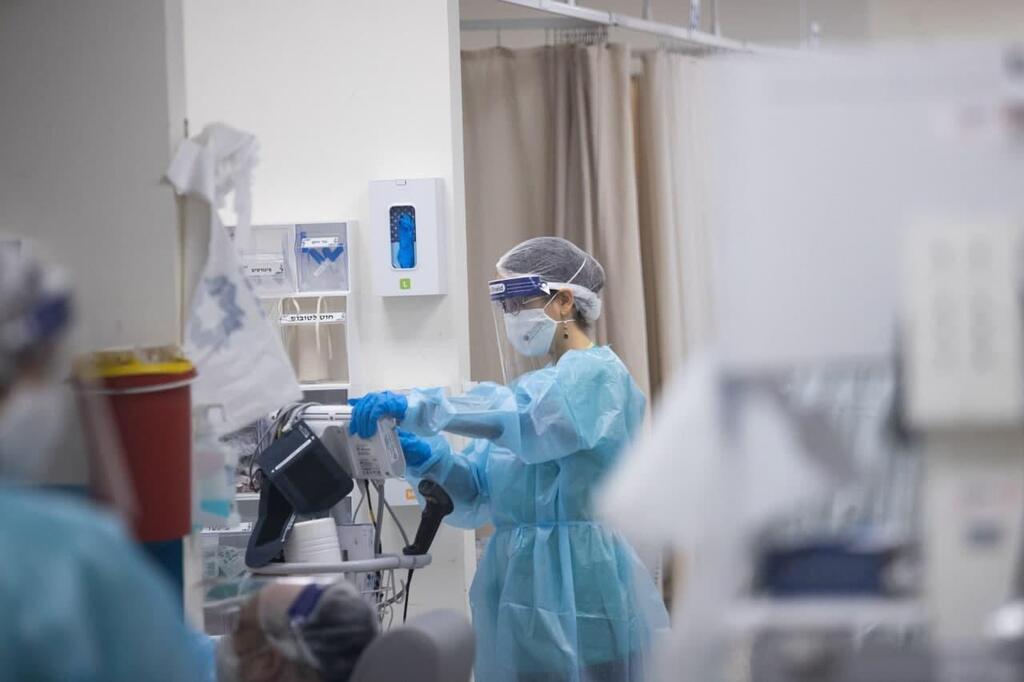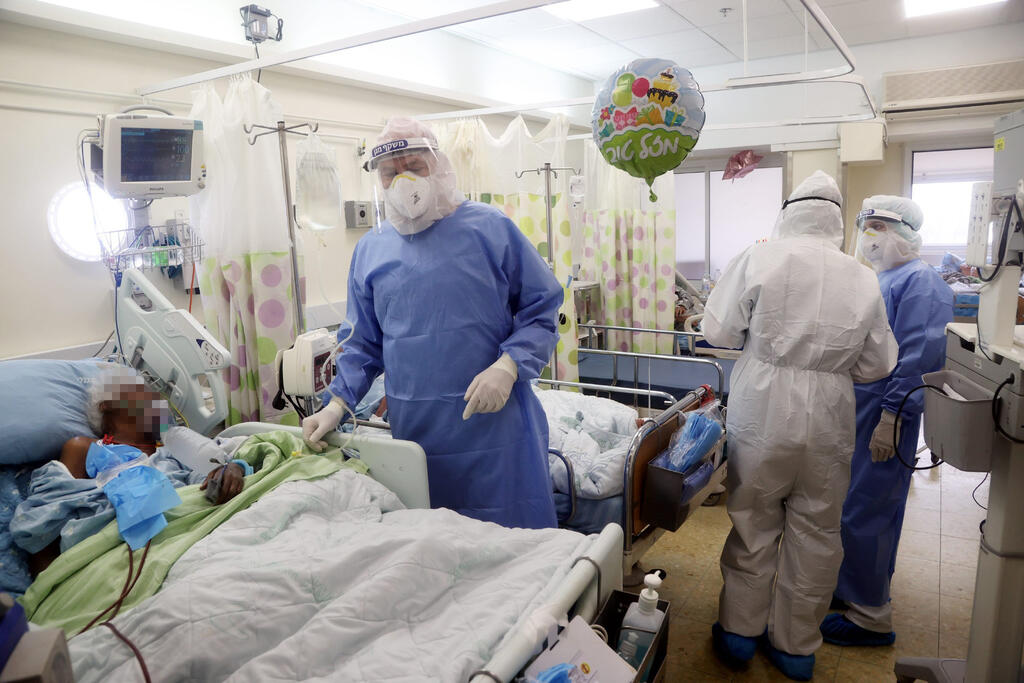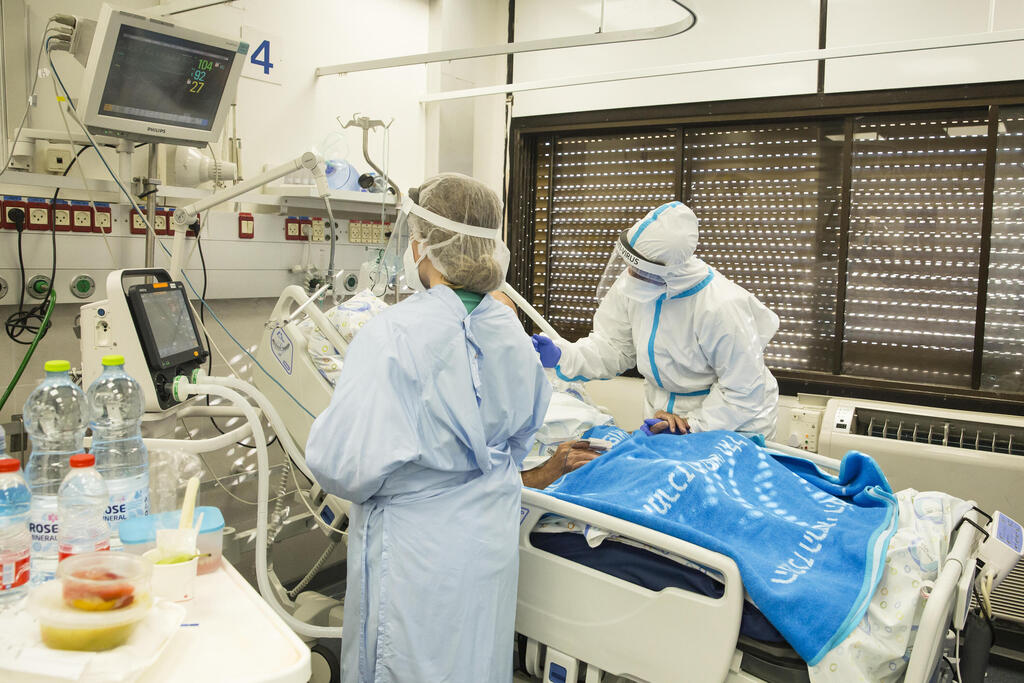Over 700 Israelis are hospitalized with COVID-19 in serious condition. Hundreds of thousands of Israelis who came down with coronavirus are in quarantine. But against the backdrop of these alarming figures, some have been voicing cautious optimism about an approaching end to the current wave, and even the pandemic as a whole.
On Sunday, World Health Organization (WHO Europe Director) Hans Kluge told AFP that the Omicron variant could infect 60 percent of Europeans by March, moving the region moving toward a kind of "pandemic endgame."
3 View gallery


Coronavirus ward at Shaare Zedek Medical Center in Jerusalem
(Photo: Alex Kolomoisky)
The latest strain, which has been shown to be particularly contagious but less severe in vaccinated people than the Delta variant, raises hopes that the pandemic is beginning to move to its endemic stage.
But notwithstanding medical teams in Israeli hospitals are working tirelessly to treat an influx of COVID patients.
A short tour of the coronavirus ward at central Israel's Kaplan Medical Center shows quite a few empty beds, but soon the reason for this becomes clear. Three patients have passed away in the morning and six others were discharged.
The available beds will not stay that way for long. Soon another patient is brought into the ward where each room houses three or four patients, most of them are rather advanced in years, with the eldest being 104 years of age.
Unlike previous waves, the division that has become almost sacred between coronavirus patients and other patients is beginning to dissolve. Hospitals are marching toward a future where most coronavirus patients are hospitalized in isolation on their original ward, rather than in a designated virus ward.
Two years into this pandemic, nobody can really point to the amorphous threshold after which the healthcare system won't be able to provide optimal care to patients, but overburdened hospitals suggest we might already be past that point.
"Three deaths in one morning is unusual," says Yahaloma Bonnie, a nurse on Kaplan's coronavirus ward who struggles to get inured to these difficult sights even after 40 years on the job.
"It's hard to put this into words. It's hard seeing this stuff, even after two years. I do not feel the pressure coming down in recent days, because patients were still admitting new patients all the time."
Bonnie says that the release of some inpatients is delayed, sometimes for days, and not for medical reasons. A significant proportion of patients are very elderly and have no families and have nowhere to go.
Down in the emergency room, things aren't any better. Over 80 patients were admitted to the hospital's ER only in the morning hours. All beds are full, and patients can find themselves waiting for hours before receiving care.
"We had one patient that waited for 12 hours to get a bed on a coronavirus ward," says a visibly exhausted Ronit Ilser, Kaplan's chief nursing officer who has over three decades of experience under her belt.
"We feel like we have been forgotten. In the beginning, people supported us and cheered us. Now, everything is forgotten. The public doesn't care about COVID anymore and we are left to carry the burden. We have prepared for several disaster scenarios in the past and have practiced everything, but no one prepared us for a pandemic of this kind."
Kaplan is not the only hospital bedeviled by endless workload.
"I have no idea where this is going," says Dr. Tatiana Michaelov, a senior doctor at Hillel Yaffe Medical Center in Hadera.
"I have no idea where this is going," says Dr. Tatiana Michaelov, a senior doctor at Hillel Yaffe Medical Center in Hadera.
"Omicron is definitely not the same as the deadly Delta variant, but look how many patients I have here. And add on top of this all the staff who are missing because they're in quarantine. This makes it very difficult for the team to work.
With every staff member that is missing on coronavirus wards, the work is compound on the rest of us. The workload is still overtaxing. It is not clear where this is going, but we're not getting any reprieve."



